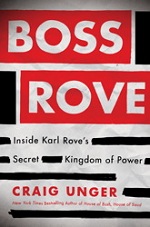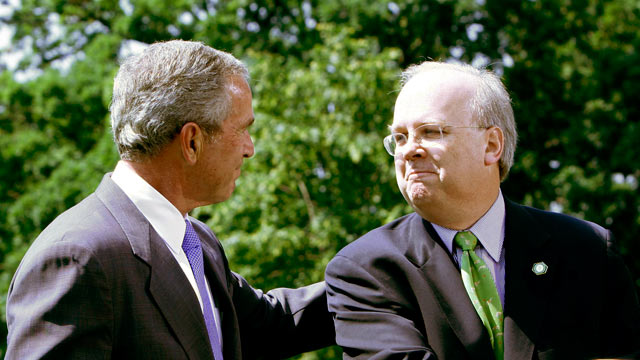This year’s presidential race heralds the comeback of GOP boss Karl Rove, the brilliant political operator whose savvy strategizing earned him the moniker “Bush’s Brain.” In this excerpt from Boss Rove, New York Times bestselling investigative reporter Craig Unger shows how, after leaving the Bush administration in disgrace, Rove worked to restore his power.
On Wednesday, April 21, 2010, about two dozen Republican power brokers gathered at Karl Rove’s five-bedroom Federal-style townhouse on Weaver Terrace in Northwest Washington, D.C., to strategize about the upcoming midterm elections in the fall.
 Rove, fifty-nine, had hosted this kind of event many times before. Six years earlier, he held weekly breakfasts for high-level GOP operatives to plan for the 2004 fall elections. Back then, as senior adviser and deputy chief of staff to President George W. Bush, a bureaucratic title that belied his extraordinary power, Rove oversaw Bush’s reelection campaign. More important, he was attempting to implement a master plan to build a permanent majority through which Republicans would maintain a stranglehold on all three branches of government for the foreseeable future. The plan was not merely to win elections. It represented a far more grandiose vision: the forging of a historic realignment of the nation’s political landscape, the transformation of America into effectively a one-party state.
Rove, fifty-nine, had hosted this kind of event many times before. Six years earlier, he held weekly breakfasts for high-level GOP operatives to plan for the 2004 fall elections. Back then, as senior adviser and deputy chief of staff to President George W. Bush, a bureaucratic title that belied his extraordinary power, Rove oversaw Bush’s reelection campaign. More important, he was attempting to implement a master plan to build a permanent majority through which Republicans would maintain a stranglehold on all three branches of government for the foreseeable future. The plan was not merely to win elections. It represented a far more grandiose vision: the forging of a historic realignment of the nation’s political landscape, the transformation of America into effectively a one-party state.
But now Rove was no longer in the White House. He had been one of the most powerful unelected officials in the United States, but, to many Republicans, his greatest achievement — engineering the presidency of George W. Bush — had become an ugly stain on the party’s reputation. “Karl Rove will be a name that’ll be used for a long, long time as an example of how not to do it, as opposed to an example of how to do it,” says GOP consultant Ed Rollins, who served as President Reagan’s political director.

President Bush, left looks towards outgoing White House Deputy Chief of Staff Karl Rove, after speaking on the South Lawn of the White House in Washington, Monday, Aug. 13, 2007. (AP Photo/Charles Dharapak)
A prime suspect in the two biggest political scandals of the decade, the Valerie Plame Wilson affair and the U.S. attorneys scandal, Rove had left the White House in 2007 under a cloud of suspicion, barely escaping indictment. His longtime patron had left the White House with the lowest approval rating in the history of the presidency: 22 percent. And in 2008 the Democrats vaporized Rove’s dreams by winning the ultimate political trifecta: the House, the Senate, and the White House. Finally, on the right, there was the insurgent Tea Party, to which he personified the free-spending Bush era and the Republican Party’s establishment past, not its future.
Rove’s personal life and finances had also fared poorly. His 2009 divorce from Darby, his wife of twenty-four years, meant the loss of more than half of his assets. And there were enormous legal bills resulting from the scandals. “I had to worry about retirement,” he told New York magazine. “I had to worry about getting back to Texas.”
But Rove was not without resources. Thanks to his columns in Newsweek and The Wall Street Journal, and a lucrative contract with Fox News, he had straightened out his personal finances and, in just two years, created a lofty bully pulpit from which to bestow upon the public the Rovian narrative about American politics.
During his seven years in the White House, Rove had been able to dispense the perks that are so vital to building political capital with the powers that be. “Having control of the White House is very heady stuff,” says Roger Stone, a GOP operative who has known Rove for forty years. “Inviting them to the White House mess, state dinners, and so on. He has a big Rolodex of Texas millionaires.”
Another arrow in Rove’s quiver came courtesy of Michael Steele, then the hapless chairman of the Republican National Committee. An unfailing source of fodder for late-night comics, Steele had just outdone himself when the RNC squandered nearly $2,000 at a lesbians-in-bondage-themed strip club in Hollywood — precisely the kind of thing the party of family values and evangelicalism didn’t need when its coffers were bare. Whether he was discussing abortion, Afghanistan, or even asserting, preposterously, that the Republican Party needed “a hip-hop makeover,” Steele had been so out of step with the party that conservative donors were desperately seeking an alternative.
Finally, Rove had one other enormously powerful ally. It could be fairly said that no other political strategist in history was so deeply indebted to the U.S. Supreme Court. In December 2010, in Bush v. Gore, one of the most notorious decisions in its history, by a 5–4 vote, the Court effectively resolved the 2000 United States presidential election in favor of Rove’s most famous client, George W. Bush. Then, on January 21, 2010, three months before his luncheon, the Supreme Court once again provided the answer to Karl Rove’s prayers, this time, in the form of Citizens United v. Federal Election Commission, another landmark decision, ruling that the First Amendment prohibits the government from limiting spending for political purposes by corporations and unions. This last decision was also made by a 5–4 majority, and this time, two of the justices voting with the majority, Samuel Alito and John Roberts, in part owed their lifetime appointments to Rove and to support from political action committees (PACs) such as Progress for America, which was tied to Rove. The first decision legitimized Rove’s power during the two administrations of George W. Bush. The second allowed Rove to reestablish his power and resurrected his efforts to create a permanent Republican majority.
The gist of the decision could be boiled down to two words: anything goes. Corporations were people now, too, ruled the court. And just as John Q. Public could say anything he liked about politics, thanks to an extraordinarily broad interpretation of the meaning of “freedom of speech,” come election time, so, too, could Wall Street, big oil, pharmaceutical companies, the tobacco industry, and billionaire cranks flood the airwaves with millions of dollars’ worth of political commercials.
To Democrats, the ruling was devastating. In his January 27, 2010, State of the Union Address, President Barack Obama asserted that “the Supreme Court reversed a century of law to open the floodgates for special interests — including foreign corporations — to spend without limit in our elections. Well, I don’t think American elections should be bankrolled by America’s most powerful interests, or worse, by foreign entities.”
“The money spent in the airtime purchase by deep-pocketed interests will dwarf the voice of average Americans . . .” predicted Senator Chuck Schumer (D-N.Y.). “It’s probably one of the three or four decisions in the history of the Supreme Court that most undermines democracy.”
In the immediate aftermath of the ruling, thousands of articles were written about Citizens United as a truly historic development in the American electoral process, but one voice was conspicuous by its absence. Karl Rove did not mention the subject in his Wall Street Journal columns. Karl Rove did not mention it during his appearances on Fox News. In fact, not a word from Karl Rove on the subject was to be found in any medium. This, despite the fact that he was indisputably a leading expert on the subject, that three out of the five conservative justices voting in the majority — Clarence Thomas, John Roberts, and Sam Alito — had been given lifetime appointments by his patrons, George H.W. and George W. Bush, and, most important, despite the fact that he would become arguably the single greatest beneficiary of the ruling.
Karl Rove was the dog that didn’t bark.

